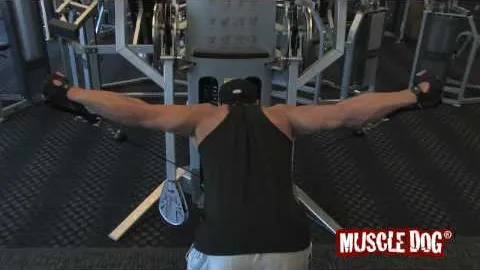
Cable Bent Over Lateral Raise: Strengthening Your Shoulders the Right Way
The Cable Bent Over Lateral Raise is an effective exercise that targets the shoulders, specifically the deltoids. This exercise is commonly performed using a cable machine, where the resistance is provided by the weight stack attached to a pulley system. By incorporating the Cable Bent Over Lateral Raise into your workout routine, you can improve your shoulder strength, stability, and overall upper body posture.
Targeted Shoulder Development: The primary benefit of Cable Bent Over Lateral Raise is its ability to target and develop the deltoid muscles. This exercise primarily focuses on the posterior deltoids, which are important for scapular retraction and shoulder stability.
Increased Range of Motion: Unlike dumbbells or other free weights, the use of cables allows for a greater range of motion during the exercise. This increased range of motion helps to fully engage and activate the targeted muscle groups, optimizing muscle development and functional strength.
Improved Shoulder Stability: The Cable Bent Over Lateral Raise is a compound exercise that not only strengthens the deltoids but also engages the surrounding muscles responsible for shoulder stability. This can help reduce the risk of injuries and improve overall upper body performance.
Variety of Grips and Angles: With a cable machine, you have the flexibility to perform the Bent Over Lateral Raise with various grips and angles. This versatility allows you to target different areas of the deltoids and adapt the exercise to your specific needs and goals.
Follow these steps to perform the Cable Bent Over Lateral Raise correctly:
Set up the Cable Machine: Adjust the pulley system of the cable machine so that the cables are at the lowest position. Attach the D-handle or stirrup handle to the cables.
Stand with Proper Positioning: Stand with your feet shoulder-width apart and your knees slightly bent. Keep your core engaged and maintain a slight bend in your elbows throughout the exercise.
Grip the Handle: Hold the handle with an overhand grip, palms facing down. Relax your shoulders and keep your arms straight throughout the exercise.
Bend at the Hips: Bend forward at the hips while maintaining a neutral spine. Keep your back straight and avoid rounding your shoulders or hunching over.
Perform the Raise: Initiate the movement by lifting the handle straight out to the side, maintaining a slight bend in your elbows. Lift your arms until they are parallel to the ground or slightly higher, ensuring that your shoulders remain engaged and your scapulae are retracted.
Controlled Descent: Slowly lower the handle back to the starting position, maintaining tension on the muscles throughout the movement. Control the weight and avoid swinging or jerking motions.
Repeat and Rotate: Repeat the exercise for the desired number of repetitions. To target different areas of the deltoids, you can also perform the Cable Bent Over Lateral Raise with different grip variations or change the angle of the cable machine.
To get the most out of your Cable Bent Over Lateral Raise exercise and ensure your safety, consider these tips and precautions:
Start with Proper Weights: Begin with lighter weights, gradually increasing the resistance as your strength improves. It's important to maintain proper form throughout the exercise to prevent injuries.
Engage Core Muscles: Keep your core muscles engaged throughout the exercise to stabilize your body and maintain proper posture. This will help avoid excessive stress on your lower back.
Avoid Jerking or Swinging: Maintain control over the movement and avoid using momentum to lift the weights. Slow and controlled motions provide greater muscle activation and reduce the risk of injury.
Listen to Your Body: If you feel any pain or discomfort during the exercise, stop immediately. Consult with a fitness professional or healthcare provider if you have any pre-existing shoulder conditions or injuries.
The Cable Bent Over Lateral Raise is a valuable exercise for building shoulder strength, stability, and overall upper body function. By properly executing this exercise and incorporating it into your regular workout routine, you can effectively target and develop your deltoid muscles. Remember to start with lighter weights and gradually increase the resistance as your strength improves. Always prioritize proper form and consult with a professional if needed. Strengthening your shoulders the right way will contribute to improved posture, reduced risk of injury, and enhanced performance in your daily activities.
If you're looking for a gym, fitness club or yoga studio, you've come to the right place.
You can find information about gyms in your area. Browse catalog of gyms and find gyms with classes which are you looking for.
On gym page you can find simple information like address, phone or website. You can find list of available classes. You can check availability of personal training or small group classes. On place page you can also see information about open hours.
You can find gyms near you with amenities, courts, studios and equipments.
Use our map to find gym at your city or district.
In Gym Navigator you can find list of exercises with movies for many body parts.
You can browse exercises catalog and find exercises the best of you.
You can also find exercises grouped into workout plans, which you can use to improve you body. Each routine show you exercises one by one and give you possibility to count you progress and count down rest time.